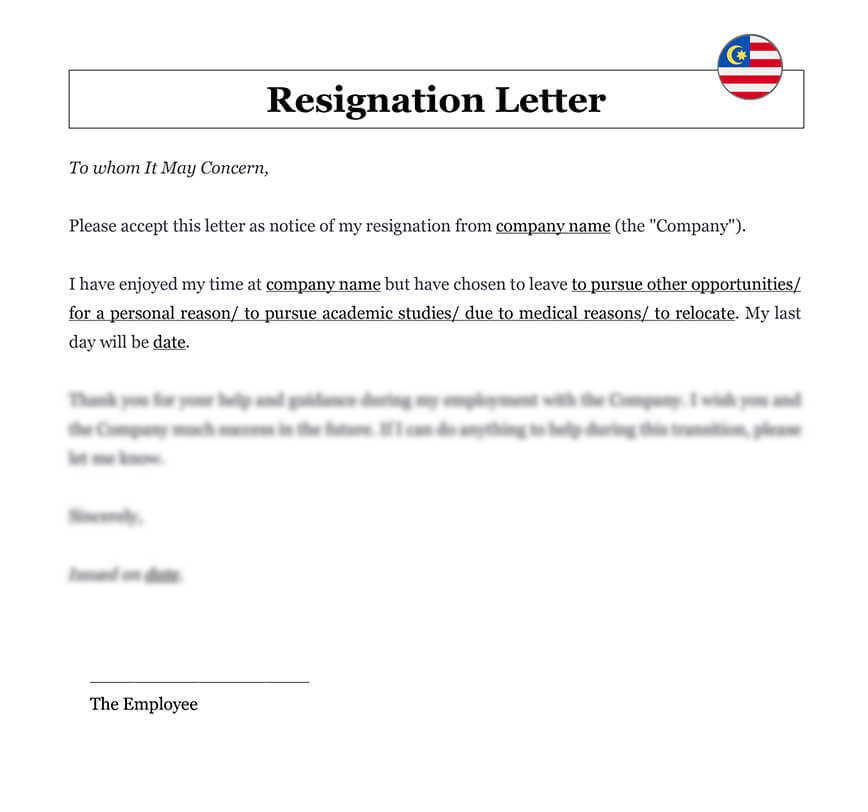Ready to use legal template
Work on without any hassle
Compliant with Hong Kong law
Ready to use legal template
Work on without any hassle
Compliant with Hong Kong law
Learn more about Employee Resignation Letter in Hong Kong
An Employee Resignation Letter is a formal document written by an employee to notify their employer of their intention to leave their current position. It serves as an official record of the employee’s decision to resign and helps ensure a smooth transition for both the employee and the employer. This letter typically includes the resignation date, the reason for leaving (optional), and expresses gratitude for the opportunity to work with the company. In Hong Kong, having a properly drafted resignation letter is crucial to comply with employment contract terms and ensure a professional departure. Whether you are resigning or managing an employee’s resignation, it is important to follow proper procedures to protect both parties’ legal interests. Download our Employee Resignation Letter, easy to edit in Word format, drafted by our experts to be used in Hong Kong.
Table of contents
-
What is an Employee Resignation Letter?
-
What is included in this Employee Resignation Letter?
-
Is an Employee Resignation Letter required by law in Hong Kong?
-
What happens if I don’t submit an Employee Resignation Letter?
-
Should I mention my last working day in the Resignation Letter?
-
Can I resign without submitting an Employee Resignation Letter?
-
How much notice should I give in my Employee Resignation Letter?
-
Do I need to provide a reason for resignation in Hong Kong?
-
Can an Employee Resignation Letter affect my severance pay?
What is an Employee Resignation Letter?
An Employee Resignation Letter is an important formal document that an employee submits to notify their employer of their intent to resign from their current position. While Hong Kong law does not mandate a written resignation, it is strongly recommended to ensure clarity and avoid potential disputes. The letter acts as an official record, confirming the employee’s decision and providing a clear outline of their notice period. It is typically submitted before the employee’s intended last working day, allowing the employer to plan accordingly. A resignation letter helps maintain professional communication and ensures compliance with company policies regarding resignation procedures. Additionally, having a formal resignation letter can be useful in addressing any potential claims or issues in the future, serving as proof of the employee’s intent and adherence to company processes.
What is included in this Employee Resignation Letter?
This Employee Resignation Letter includes several key clauses to ensure clarity and professionalism in the resignation process:
| ➤ Resignation Notice: The letter begins with a clear and direct statement notifying the employer of the employee’s decision to resign. It states the position being resigned from and the effective date of resignation, helping both parties manage expectations and plan accordingly. |
| ➤ Reason for Resignation: Although optional, the letter offers space for the employee to provide a brief explanation for their departure. Common reasons may include pursuing a new job opportunity, relocating, personal or family obligations, academic studies, or health concerns. This clause allows the employer to understand the context of the decision without requiring detailed justifications. |
| ➤ Last Working Day: To comply with contractual notice requirements, the letter specifies the employee’s final working day at the company. This helps HR and management schedule the transition of duties and prepare for offboarding procedures. |
| ➤ Acknowledgment of Gratitude: The employee is encouraged to include a paragraph expressing appreciation for the experience, mentorship, and opportunities gained during their employment. This reinforces goodwill and helps maintain a positive professional relationship post-resignation. |
| ➤ Offer of Assistance in Transition: The letter includes a statement offering to help with the handover of tasks and support a smooth transition, such as training a replacement or documenting procedures. This gesture of professionalism can leave a lasting impression. |
| ➤ Well Wishes for the Company: The employee extends sincere wishes for the continued success and growth of the company. Including this clause shows maturity and helps end the relationship on a respectful and courteous note. |
| ➤ Signature and Date: Finally, the letter is formally signed and dated by the employee, confirming the date of submission for administrative and legal reference. |
Is an Employee Resignation Letter required by law in Hong Kong?
1. Employee Resignation Letter Requirements
In Hong Kong, while there is no statutory requirement for an Employee Resignation Letter, it is generally considered good practice. Many employment contracts include clauses specifying how notice should be given, whether verbally or in writing. Although not legally mandated, submitting a resignation letter provides clarity and creates an official record of the employee’s decision. This formal document helps avoid misunderstandings related to notice periods, final pay, or severance benefits, which can otherwise lead to disputes between the employee and employer.
2. Importance of Written Resignation
Even when not explicitly required by law, submitting a written resignation is advisable, particularly in regulated industries or for senior employees. In such cases, written notice may be necessary to meet internal company policies or comply with industry regulations. The resignation letter serves as evidence of the employee’s intention to leave the company, thereby safeguarding both the employee’s and employer’s rights during the transition period. For further details, refer to Hong Kong Labour Department.
What happens if I don’t submit an Employee Resignation Letter?
1. Importance of a Formal Resignation Letter
Failing to submit a formal resignation letter may lead to confusion or disputes regarding the timing and legitimacy of the resignation. Without proper written documentation, it becomes difficult to prove when the employee formally resigned or whether the required notice period was provided. This can complicate matters when it comes to calculating final wages, unused leave, and other benefits that depend on the resignation date. A written resignation ensures that both the employee and employer are clear about the terms and timing of the resignation.
2. Legal and Compliance Considerations
Though not always legally required, submitting a formal resignation letter provides both parties with protection during the offboarding process. Employers may require a written resignation letter for auditing, tax filing, or compliance with internal policies. It also helps in processing mandatory benefits, such as the Mandatory Provident Fund (MPF) contributions, and in confirming the official end date of employment. By submitting a formal resignation letter, employees ensure a smoother transition and help avoid potential misunderstandings or legal disputes later on.
ℹ️ A Remote Working Contract may include specific clauses related to resignation or termination, especially when the employee is working remotely, ensuring clarity in the transition process.
- Remarks:
Failure to submit a resignation letter may create confusion regarding your resignation date, final pay, and benefits. It is highly recommended to submit a formal resignation to avoid disputes about the termination process. Written resignation helps ensure a smoother transition and compliance with both company policies and legal requirements.
Should I mention my last working day in the Resignation Letter?
It is highly advisable to clearly specify your intended last working day in your resignation letter. This helps both you and your employer manage the transition effectively. Below is an outline of why and how to handle your resignation date:
| ➤ Advisability: It is highly advisable to specify your intended last working day in the resignation letter. |
| ➤ Notice Period: The resignation date should comply with the notice period stated in your employment contract or the default period under the Employment Ordinance (typically one month for monthly-paid employees). |
| ➤ Employer's Preparation: Clearly stating your last working day allows your employer to plan for your departure, arrange a handover, and process your final pay and benefits correctly. |
| ➤ Leaving Before Notice Period: If you wish to leave earlier than the notice period, you may need to negotiate with your employer or offer payment in lieu of notice, subject to mutual agreement. |
Can I resign without submitting an Employee Resignation Letter?
1. The Importance of Written Resignation
Although you can technically resign verbally or through informal means, it is strongly advised to submit a written resignation. A written resignation serves as a clear, formal record of your decision to leave the company. This avoids any ambiguity that may arise in the future regarding your intent. Employers typically require a written notice before processing your final paycheck or starting the exit procedures. A clear, documented resignation also helps to ensure that the process proceeds smoothly and professionally without confusion or delays. In some cases, failure to submit a written resignation may lead to misunderstandings or complications during the termination process.
2. Protection Against Disputes
Having a signed, written resignation letter provides valuable protection in case a dispute arises about the nature of your departure. If there is any question as to whether you resigned voluntarily or were terminated, the written resignation offers proof of your intent. It serves as clear evidence that the decision to leave was yours, which can protect you from potential legal claims or misunderstandings. Without such documentation, the employer may claim that your departure was not voluntary, which could complicate matters related to severance, benefits, or future employment references.
ℹ️ The Employee Probation Period Termination letter addresses the early end of an employee’s probation period, which may also be relevant in situations of resignation or non-performance during probation.
How much notice should I give in my Employee Resignation Letter?
1. Notice Period Requirements
The notice period you must give when resigning depends on the specific terms outlined in your employment contract. Many employment contracts in Hong Kong specify a one-month notice period or allow for payment in lieu of notice if you prefer to leave immediately. If your contract does not clearly define the notice period, the Employment Ordinance mandates a minimum notice period of seven days. Always ensure you understand the terms in your contract regarding notice requirements to avoid complications when you decide to resign. For more details, refer to the Hong Kong Employment Ordinance.
2. Importance of Adhering to the Notice Period
Giving the appropriate notice as stipulated in your contract is crucial for maintaining a positive professional reputation. Failing to provide the required notice could negatively impact your relationship with your employer, potentially affecting future references or opportunities. Additionally, adhering to the notice period ensures that you receive all entitled benefits, including accrued leave and end-of-service payments. It also allows the company adequate time to manage your departure and make any necessary arrangements for transitioning your duties to someone else.
ℹ️ The Employment Contract outlines the terms and conditions of your employment, including the required notice period for resignation, which is essential when submitting your Employee Resignation Letter.
- Remarks:
Always refer to your employment contract to determine the required notice period, typically one month for monthly-paid employees. Failing to adhere to the notice period may damage your professional reputation or result in financial penalties. Ensure that you comply with contractual requirements to avoid misunderstandings with your employer.
Do I need to provide a reason for resignation in Hong Kong?
In many cases, providing a reason for resignation is optional and not legally required. However, it is often appreciated by employers as it helps maintain a positive relationship and professional reputation. Below is an outline of the key considerations when deciding whether or not to provide a reason for your resignation.
| ➤ Legal Requirement: No legal requirement exists to provide a reason for resignation. |
| ➤ Common Reasons for Resignation: Reasons such as career advancement, personal commitments, health issues, or family relocation are common and generally appreciated. |
| ➤ Option to Decline Providing a Reason: If you prefer not to disclose a reason, you can simply state you are resigning due to personal reasons. |
| ➤ Tone of Resignation: Regardless of the reason provided, ensure the tone remains respectful and positive to preserve professionalism and goodwill. |
Can an Employee Resignation Letter affect my severance pay?
1. Severance and Long-Service Payments
In Hong Kong, your eligibility for severance or long-service payments is determined by several factors, including your length of service and the reason for leaving. Typically, if you resign voluntarily, you are not entitled to severance pay unless specific circumstances apply, such as redundancy or ill health. If you have worked for the same employer for five or more years and decide to resign, you may be entitled to a long-service payment, unless you are already receiving a pension or gratuity. The terms of your resignation, including the cause of leaving, will play a critical role in determining your entitlement to these payments.
2. Impact of Resignation Reason
Although the submission of your resignation letter does not directly affect your eligibility for severance or long-service payments, the reason for your resignation can have a significant impact on your rights. For example, resigning due to illness or redundancy can qualify you for severance pay, even if you voluntarily leave the company. It’s important to ensure that your resignation aligns with legal criteria to avoid forfeiting potential entitlements. For clarity on your rights and to confirm your eligibility, it’s advisable to consult the Employment Ordinance or seek legal counsel.
Conclusion
A well-crafted Employee Resignation Letter is a valuable tool for ensuring a professional and lawful end to the employment relationship in Hong Kong. While not legally mandatory in all cases, it helps clarify intentions, respects contractual obligations, and protects the interests of both the employee and the employer. By including essential elements such as the resignation date, last working day, reason for resignation, and expressions of gratitude and cooperation, employees demonstrate professionalism and preserve valuable relationships for future opportunities. Employers, in turn, should acknowledge receipt of the letter in writing, ensure proper calculation of final entitlements, and provide a reference if appropriate. When handled properly, a resignation can be a respectful conclusion to one chapter and a positive beginning to the next for both parties.
SPECIAL OFFER
HR Pro
15 Document Package
Essential documents for managing employees in Hong Kong
Resignation LetterTemplate (.docx)
Easy and quick to customize
310 client reviews (4.8/5) ⭐⭐⭐⭐⭐
Share information
Why Themis Partner ?
Make documents forhundreds of purposes
Hundreds of documents
Instant access to our entire library of documents for Hong Kong.
24/7 legal support
Free legal advice from our network of qualified lawyers.
Easily customized
Editable Word documents, unlimited revisions and copies.
Legal and Reliable
Documents written by lawyers that you can use with confidence.




